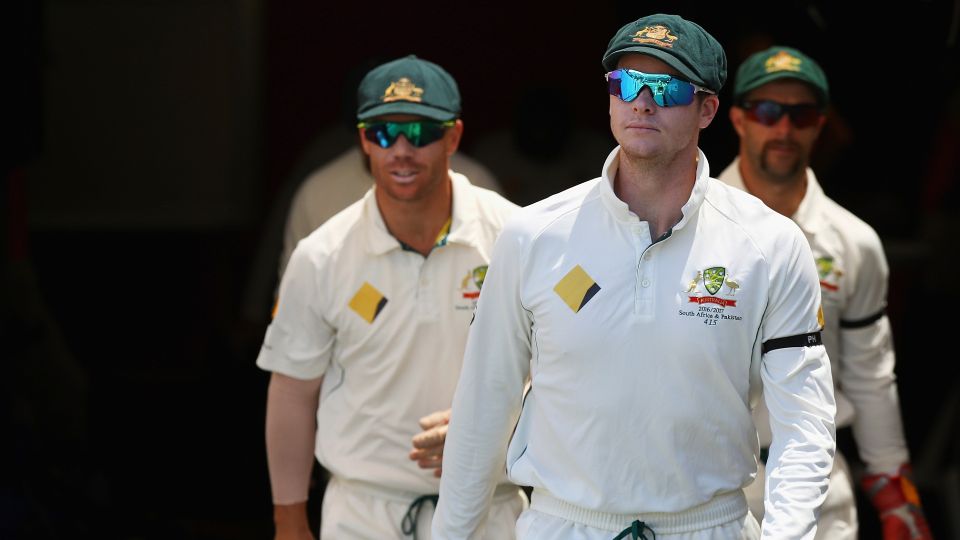 03:46
03:46
What exactly is the Cricket Australia-ACA pay dispute?
Australia’s players are willing to compromise on a major financial sticking point that lies at the heart of their ongoing pay dispute with Cricket Australia (CA). As the board’s nine directors met in Brisbane on Thursday, the Australian Cricketers Association (ACA) opened up a potential path for more productive talks, by indicating they are open to a redefinition – and reduction – of the revenue they are entitled to share in.
That led to a reciprocal response from CA, who have expressed their own willingness to be “flexible”. In a negotiation period that began last November and has been the most divisive and bitter in 20 years, this may be a significant step forward ahead of the June 30 deadline by which the parties must find agreement.
CA has repeatedly claimed that the ACA is seeking a share of all revenue in the game for professional players, including from such areas as sponsorships of grassroots competitions and junior registrations. The claim was made explicit in a briefing note distributed to media last week, which said:
“A proportion of revenue from the sponsorship of grassroots cricket programs has to be distributed to elite player payments. Under the ACA’s new proposal, a guaranteed 22.5% of all CA and the states and associations revenue means the players would receive 22.5 cents of every dollar spent by parents on a junior registration fee.”
However, the ACA have now confirmed that the players’ flexibility over the next pay agreement extends to being “open to a discussion of what is in and what is out of shared revenue streams.” The position was conveyed in a letter to the CA chairman David Peever last month.
A narrower definition of agreed revenue may be the first building block of a deal between the parties. It would remove the impending risk of a major industrial relations battle, in a year when Australia are scheduled to play a home Ashes series after tours of South Africa, Bangladesh and India.
“The players have always had and still do have flexibility,” the ACA president Greg Dyer said, striking a far less confrontational tone. “There is room to move to modernise this partnership. The ACA can discuss new models of revenue sharing, and how we can collectively manage risk.”
A CA spokesman said the board was also prepared to be flexible. “CA believes there is still time to conclude an MoU by 30 June and reiterates its preparedness to be flexible in negotiations,” he said. “CA urges the ACA to spend more time at the negotiating table and less time writing press releases in order to begin making progress towards a resolution.”
Less than a month remains before the expiry of the current MoU, with CA threatening that all players out of contract will be unemployed should the ACA not agree to discuss its current pay offer. A key plank of the offer is the replacement of revenue sharing with fixed wages for players, with only international players entitled to any of the game’s “blue sky” above that, while state player contract levels are effectively frozen over the next five years.
CA’s tactics have included efforts to put space between the ACA and the players, including the team performance manager Pat Howard’s attempts to deal directly with all contracted players by email. Howard recently offered multi-year deals to the top five CA-contracted players – Steven Smith, David Warner, Mitchell Starc, Josh Hazlewood and Pat Cummins – under the board’s new terms, an approach that was quickly rebuffed.
The allrounder Moises Henriques, who is also part of the ACA executive, said the association was working closely with the players, and that they were willing to be flexible in the interests of reaching an agreement with CA.
“We’re a part of the decision-making process, in strategy and how we play it … and the ACA are just a representative agent of the players,” he said. “Really, the decisions get made by the players and the ACA acts on their behalf.
“It’s not like we [the ACA] are going to do anything the players don’t want to do. Coming to an agreement would be the best way forward. What we’ve got to worry about is that agreement being made as quickly as possible. Maybe CA may have to give a little bit, we may have to give a little bit, who knows. But the players know we need to get to an agreement. Guys want to play international cricket, guys want to play state cricket. The players want it sorted and I am sure CA do as well.”
Daniel Brettig is an assistant editor at ESPNcricinfo. @danbrettig
© ESPN Sports Media Ltd.
Source: ESPN Crickinfo
